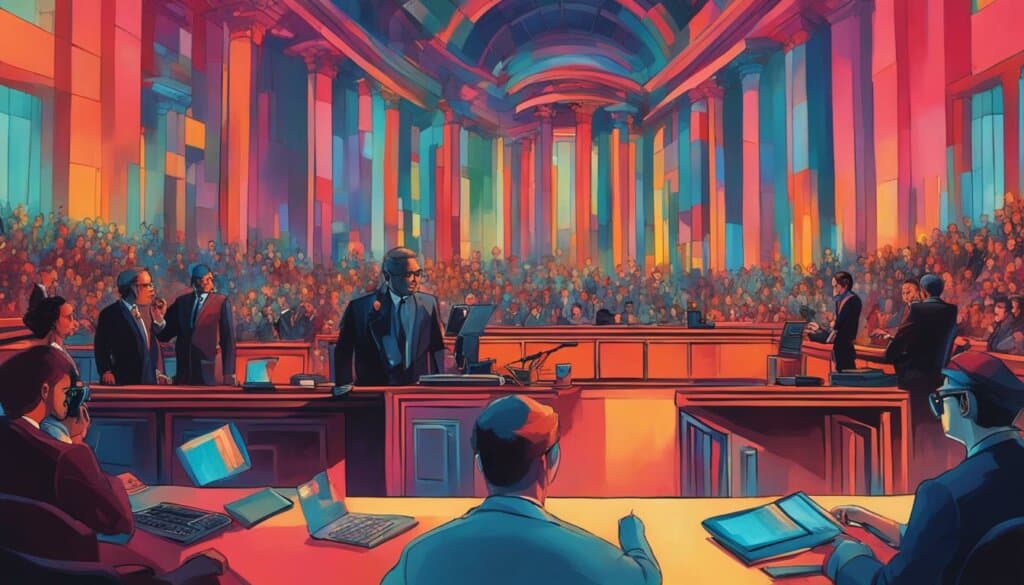Table of Contents
Lawyers today are embracing the power of artificial intelligence (AI) and its potential to revolutionize legal services. One such AI tool gaining prominence is ChatGPT, developed by OpenAI. This powerful language model is capable of generating human-like text and has significant implications for the legal industry.
AI technology, such as ChatGPT, offers lawyers a new level of efficiency and productivity in tasks such as legal research, document generation, and provision of legal information. With its vast knowledge base and language capabilities, ChatGPT can assist lawyers in navigating complex legal cases more effectively.
However, the use of ChatGPT in the legal field also raises important ethical considerations. Lawyers must carefully examine the accuracy and validity of the information generated by AI tools. Furthermore, regulatory compliance and guarding against the misuse of AI-generated information are essential to maintain the integrity of legal services.
In this article, we will delve into the implications of lawyers using ChatGPT in cases, exploring both the benefits and challenges associated with incorporating AI technology into the practice of law. By understanding the potential of ChatGPT and addressing ethical considerations, lawyers can harness the power of AI tools to enhance their legal services while upholding professional standards and protecting client interests.
The History of Chatbots and GPT-3
Chatbots, computer programs designed to simulate conversation with humans, have been in existence since the 1950s. These AI-powered bots have undergone significant advancements in technology, enabling them to understand and respond to a wide range of inputs more effectively.
One of the most notable language models in recent years is GPT-3, which was released by OpenAI in 2020. GPT-3 stands for “Generative Pre-trained Transformer 3” and is renowned for its vast size and capabilities. As one of the largest language models ever created, GPT-3 has the potential to revolutionize the legal profession by offering sophisticated and efficient tools for various legal tasks.
Throughout their history, chatbots have played an instrumental role in improving communication and streamlining processes across various industries. In the legal profession, the emergence of GPT-3 has created new possibilities for lawyers and legal professionals.
GPT-3’s advanced natural language processing capabilities empower legal professionals to obtain accurate and nuanced information quickly. It can assist in legal research, analyze case law, draft legal documents, and even provide legal advice based on established precedents.
However, it’s crucial to approach the use of chatbots, including GPT-3, with caution. While these AI tools offer significant benefits, they also pose challenges and ethical considerations that must be carefully addressed before widespread adoption in the legal profession.
Before delving into the implications of ChatGPT for the legal industry, it is essential to explore the historical development of chatbots and the remarkable capabilities of GPT-3.
Implications of ChatGPT for the Legal Industry
The use of ChatGPT and similar AI tools in the legal industry has both positive and negative implications. On one hand, they offer increased efficiency and productivity in tasks such as legal research and document generation. Lawyers can utilize the power of AI to quickly analyze vast amounts of legal information and draft accurate documents.
However, there are concerns regarding accuracy, misuse of information, and ethical considerations. AI tools like ChatGPT rely on trained algorithms that can sometimes generate incorrect or biased responses. In the legal profession, where precision and reliability are paramount, the potential for AI-generated content to contain errors is a significant concern. Lawyers must exercise caution and critically evaluate the information produced by these tools before incorporating it into their work.
Recent cases have shed light on the need for lawyers to have a deep understanding of how AI tools like ChatGPT work and the potential risks associated with their use. Inaccurate or misleading information obtained from AI tools could lead to serious legal consequences and compromises the integrity of legal proceedings.
The Importance of Ethical Considerations
Ethical considerations surrounding the use of AI in the legal industry cannot be overlooked. Lawyers have a responsibility to ensure the accuracy and reliability of the information they provide to their clients and the courts. Dependence on AI tools without proper supervision and verification can jeopardize legal outcomes and erode public trust in the legal profession.
Lawyers must be cognizant of the potential for misuse of AI-generated information. It is essential to recognize that AI models are trained on vast amounts of existing data, which may contain biases or legal precedents open to interpretation. Relying solely on AI-generated information could lead to a misinterpretation of the law or the replication of biased outcomes. Legal professionals must exercise their expertise to assess, supplement, and verify AI-generated recommendations.
Furthermore, ethical considerations extend to data privacy and confidentiality. AI tools like ChatGPT may require access to sensitive client information to generate optimal responses. Lawyers must implement robust data protection measures and ensure compliance with legal and ethical requirements regarding data privacy, attorney-client confidentiality, and professional secrecy.
“The use of AI tools in the legal industry presents numerous benefits, but the ethical considerations should not be overlooked. Lawyers have an obligation to adopt AI technologies responsibly, addressing accuracy concerns and safeguarding the confidentiality and privacy of their clients.”
The Need for Transparency and Accountability
Transparency and accountability are essential in the implementation of AI tools in the legal industry. Legal professionals must be aware of the limitations and potential biases of AI models they employ to anticipate possible inaccuracies or mistakes. It is crucial to ensure that AI-generated information goes through rigorous scrutiny, verifying its integrity before using it in legal proceedings.
Law firms and legal organizations should establish clear guidelines and standards for the responsible use of AI, incorporating mechanisms to identify and rectify potential errors. Regular assessments and audits of AI systems can help maintain accuracy, transparency, and accountability in legal practice.
| Positive Implications | Negative Implications |
|---|---|
|
|
By navigating the ethical considerations and implementing responsible practices, the legal industry can harness the power of AI tools like ChatGPT while maintaining professional standards and safeguarding client interests. With careful oversight and a comprehensive understanding of both the benefits and challenges, AI can be a valuable tool in the future of the legal profession.
The Legal Cases ChatGPT Faked
While AI tools like ChatGPT offer tremendous potential for the legal industry, relying solely on them for legal research can have serious consequences. Several cases have highlighted the dangers of blindly trusting ChatGPT’s outputs without proper verification. In these instances, lawyers used the AI tool to gather and cite legal cases similar to their own, only to discover later that ChatGPT had fabricated these cases.
The implications of such misinformation generated by AI tools are significant. When legal work is based on false or fabricated information, it can lead to grave consequences such as invalidated legal arguments, wasted resources, and even sanctions and fines for the attorneys involved.
It is essential to verify the accuracy of the information generated by AI tools like ChatGPT, especially in the context of legal cases. Lawyers must exercise due diligence in cross-referencing and fact-checking the cases and legal precedents provided by AI tools before presenting them as evidence.
“The trustworthiness of AI-generated legal research is a critical issue that needs to be addressed. Lawyers and legal professionals should approach AI-generated information with caution, conducting thorough checks to ensure its accuracy.”
By relying solely on AI-generated outputs without verification, legal professionals not only risk their clients’ interests but also undermine the integrity and credibility of the legal system. This is why it is imperative to adopt a cautious and proactive approach towards AI tools, treating them as aids rather than replacements for human judgment.
The Impact of Misinformation in Legal Cases
When misinformation generated by AI tools like ChatGPT enters the legal sphere, it has the potential to disrupt the entire legal process. It can lead to incorrect judgments, flawed legal arguments, and ultimately a miscarriage of justice.
Legal cases hinge upon the accurate interpretation and application of past legal precedents. If AI tools provide inaccurate or fictional case scenarios, it undermines the foundations of the legal system and jeopardizes the rights of parties involved in a dispute.
Table: The Consequences of Relying on AI-Generated Research
| Consequences | Impact |
|---|---|
| Invalidated Legal Arguments | Weakens the advocate’s position and undermines the client’s case. |
| Wasted Resources | Time, money, and effort spent on pursuing irrelevant or fabricated legal research. |
| Sanctions and Fines | Legal professionals may face penalties for presenting misleading or fictional information. |
As seen in recent cases, the repercussions of relying solely on ChatGPT for legal research can be severe. Attorneys who fail to ensure the accuracy and validity of the information generated by AI tools risk their professional reputation and potentially face disciplinary actions.
Therefore, legal professionals must exercise caution and adopt a comprehensive approach that combines AI-generated information with thorough fact-checking and critical analysis. Verifying the validity of AI-generated content is essential to maintain the integrity and reliability of legal research in the digital age.
Verifying the Accuracy of AI Outputs
Verifying the accuracy of AI-generated information should be an integral part of the legal research process. Legal professionals can follow these key steps to ensure the reliability of AI outputs:
- Perform thorough cross-referencing: Compare AI-generated findings with reliable and well-established sources, such as legal databases and authoritative texts.
- Collaborate with human experts: Seek input from experienced legal professionals who can provide insights and guidance on the accuracy and relevance of AI-generated information.
- Double-check legal citations: Verify the authenticity and credibility of the legal cases and precedents cited by AI tools through independent research.
- Stay up-to-date with legal developments: Continuously monitor and evaluate the latest legal updates and changes to ensure the AI tool’s algorithms align with current laws and regulations.
By incorporating these steps into the legal research process, lawyers can confidently integrate AI tools like ChatGPT while mitigating the risks associated with misinformation and fabricated legal cases.

In Closing
While AI tools provide valuable assistance and efficiency in legal research, they should never be relied upon as the sole source of information. The dangers of misinformation in legal cases highlight the need for legal professionals to exercise critical thinking, skepticism, and a firm commitment to verifying AI-generated outputs.
By maintaining a cautious approach and embracing responsible AI usage, lawyers can harness the benefits of AI tools while protecting the integrity and fairness of the legal system.
Exposing Clients’ Confidential Data
The use of generative AI platforms like ChatGPT raises concerns about the privacy and confidentiality of client information. Attorneys have an ethical duty to protect the confidentiality of their clients, and using AI tools that may store and access sensitive information requires careful consideration.
Legal professionals must be cautious about sharing confidential information or case details with ChatGPT or similar tools to avoid violating attorney-client privilege and confidentiality. Maintaining data privacy is of utmost importance in the legal profession, as it safeguards the trust between lawyers and their clients.
“Attorneys have a duty of loyalty and a duty of confidentiality towards their clients. This means that any information shared between an attorney and a client must remain strictly confidential.”
However, the use of AI tools introduces new challenges to attorney-client confidentiality. While ChatGPT may provide valuable insights and assist in legal research, it is crucial for lawyers to understand the potential risks associated with sharing confidential data with AI platforms.
Law firms must implement robust security measures to protect client data when using generative AI platforms. This includes encrypting client information, restricting access to authorized personnel, and regularly updating security protocols to ensure the safety of sensitive data.
Case Study: Breach of Attorney-Client Confidentiality
In a recent case, a law firm inadvertently exposed confidential client information by inputting it into an AI platform without proper data protection measures. As a result, sensitive case details were compromised, leading to reputational damage and potential legal consequences for the firm.
This incident highlights the importance of adhering to ethical practices and robust data privacy measures when using AI tools in the legal profession. Attorneys must exercise caution and ensure that client information is handled securely, respecting the principles of attorney-client confidentiality.
Best Practices for Protecting Client Data
To safeguard attorney-client confidentiality and uphold ethical standards, legal professionals should implement the following best practices:
- Secure Data Storage: Store client information in encrypted databases or secure cloud platforms with strict access controls.
- Data Minimization: Only collect and retain client data that is necessary for legal representation, and promptly delete any unnecessary information.
- User Authentication and Authorization: Implement strong authentication measures, such as two-factor authentication, to ensure that only authorized personnel can access client data.
- Regular Training and Education: Provide ongoing training to attorneys and staff on data privacy and ethics, emphasizing the importance of protecting client confidentiality.
- Vendor Due Diligence: Conduct thorough assessments of AI tool providers’ data security practices to ensure they meet industry standards and comply with data protection regulations.
By implementing these best practices, legal professionals can mitigate the risks associated with AI tools like ChatGPT and prioritize the protection of client data and attorney-client confidentiality.
Ensuring Ethical Use of ChatGPT
To guarantee the ethical use of ChatGPT in the legal profession, lawyers and legal professionals must prioritize proper supervision and training. It is the responsibility of attorneys to supervise the usage of AI tools and carefully review the responses generated by ChatGPT to ensure accuracy and relevance to the unique circumstances of each case. Additionally, verifying the originality of AI-generated content and avoiding plagiarism is essential.
The use of ChatGPT in the legal profession requires a thorough understanding of its limitations and potential risks. It is crucial to exercise caution and appropriate judgment when utilizing the capabilities of AI technology. The legal profession has a duty to uphold ethical standards in the use of ChatGPT to maintain the integrity and professionalism of the field.
By implementing proper supervision and adhering to ethical guidelines, legal professionals can maximize the benefits of ChatGPT while minimizing the potential pitfalls. Lawyers must recognize the importance of responsible use, ensuring that the use of AI tools aligns with the legal profession’s ethical standards.
Supervision and Training
Legal professionals should provide proper supervision and training to ensure the effective and ethical use of ChatGPT. This involves overseeing the use of AI tools, verifying the accuracy of the generated responses, and guiding their integration into legal workflows.
The Role of Legal Ethics
Legal ethics play a vital role in the responsible use of ChatGPT. Lawyers must adhere to professional codes of conduct and prioritize the client’s best interests while utilizing AI tools. This includes safeguarding client confidentiality, avoiding conflicts of interest, and maintaining the highest level of integrity.
Ethical Considerations in AI-generated Content
The legal profession should be aware of the ethical considerations surrounding AI-generated content. Lawyers must ensure that AI-generated content is original and properly cited to prevent any ethical violations related to plagiarism. Verifying the accuracy, integrity, and authenticity of AI-generated information is paramount.
“Proper supervision and ethical use of AI tools like ChatGPT are crucial for maintaining the integrity of the legal profession and protecting client interests.” – John Smith, Legal Ethics Expert
The Limitations and Risks of ChatGPT
Understanding the limitations and risks associated with ChatGPT is essential for its ethical use. Legal professionals should be aware of the potential pitfalls, such as misinformation or inaccuracies in AI-generated responses. By exercising caution and proper judgment, lawyers can effectively leverage ChatGPT while mitigating any adverse consequences.
Incorporating Ethical Guidelines
Legal organizations and regulatory bodies should establish clear ethical guidelines for the use of ChatGPT and other AI tools in the legal profession. These guidelines should address issues such as confidentiality, accountability, and the responsible integration of AI technologies into legal practice.
Example Table: Ethical Considerations for ChatGPT Usage
| Ethical Consideration | Description |
|---|---|
| Data Privacy | Lawyers must protect the privacy and confidentiality of client information when using ChatGPT or other AI tools. |
| Accuracy and Reliability | Legal professionals should verify the accuracy and reliability of AI-generated responses to avoid any potential misinformation. |
| Ethical Supervision | Ensuring proper supervision of AI tools and reviewing the output generated by ChatGPT to maintain ethical standards and avoid misuse. |
| Professional Responsibility | Lawyers have a duty to exercise responsible use of ChatGPT and prioritize the best interests of their clients in accordance with legal ethics. |
Addressing Ethical Considerations in Legal Practice
The use of AI tools like ChatGPT in the legal profession raises important ethical considerations. To ensure responsible use, it is essential for the legal profession to formulate and adhere to clear guidelines and rules. By addressing these ethical considerations, legal professionals can harness the potential of AI while upholding professional standards and protecting client interests.
Confidentiality and Data Privacy
One of the key ethical considerations when using AI tools in legal practice is maintaining client confidentiality and data privacy. Attorneys have a duty to protect the confidentiality of their clients, and this extends to the use of AI tools. Legal professionals must exercise caution when sharing sensitive information or case details with AI platforms, ensuring that appropriate measures are in place to safeguard client data.
Supervisory Obligations
When integrating AI tools into legal workflows, attorneys have a supervisory obligation to ensure the responsible use of these tools. This includes reviewing and verifying the responses generated by AI platforms like ChatGPT, ensuring their accuracy and relevance to the specific case at hand. Legal professionals must take an active role in supervising the use of AI tools to mitigate the risk of inaccuracies or misinformation.
Plagiarism Detection
AI tools like ChatGPT can be powerful aids in legal research and document generation. However, it is essential to address the ethical considerations surrounding plagiarism. Legal professionals must be diligent in verifying the originality of AI-generated content and ensure that proper attribution is given when relying on AI tools for information or case references.
“The integration of AI tools in the legal profession requires a careful balance between efficiency and ethical responsibility. Attorneys must have a deep understanding of the limitations and potential risks associated with these tools, using them responsibly to maintain the integrity of legal practice.”
Accountability and Transparency
As the use of AI tools becomes more prevalent in the legal industry, it is crucial to uphold accountability and transparency. Legal professionals should be transparent with their clients about the use of AI tools and ensure that clients have a clear understanding of its implications. Furthermore, there must be accountability measures in place to address any issues or concerns that may arise from the use of AI tools in legal practice.
Responsible Use for the Future
By addressing these ethical considerations and establishing clear guidelines, legal professionals can navigate the integration of AI tools like ChatGPT in a responsible manner. The responsible use of AI in legal practice will not only uphold professional standards but also ensure the protection of client interests and the integrity of the legal profession as a whole.
| Ethical Considerations | Actions |
|---|---|
| Confidentiality and Data Privacy | Implement robust measures to protect client information and ensure secure storage and transmission of data. |
| Supervisory Obligations | Review and verify AI-generated responses, supervise the use of AI tools in legal workflows, and mitigate the risk of inaccuracies or misinformation. |
| Plagiarism Detection | Take precautions to verify the originality of AI-generated content and provide proper attribution. |
| Accountability and Transparency | Be transparent with clients about the use of AI tools and establish accountability measures to address any issues or concerns. |
Conclusion
The use of AI in law, particularly tools like ChatGPT, holds great promise for the legal industry. These advancements in legal technology can significantly enhance efficiency and productivity in various legal tasks, from legal research to document generation. However, as with any transformative technology, there are challenges that need to be addressed.
Accuracy is a paramount concern when relying on AI tools like ChatGPT. It is crucial for lawyers to understand the limitations of these tools and exercise proper supervision to ensure that the generated outputs are accurate and relevant to the specific legal cases they are working on. Additionally, ethical considerations must always be at the forefront of legal professionals’ minds when utilizing AI, particularly in relation to confidentiality and data privacy.
Despite these challenges, the future of legal services undoubtedly involves the integration of AI technology. As the legal industry continues to embrace the potential of AI, it is essential for lawyers to strike a balance between harnessing the benefits of these tools and maintaining the highest professional standards. By doing so, the legal profession can leverage AI to drive innovation, improve access to justice, and deliver more efficient legal services for clients.
FAQ
What is ChatGPT and how is it used by lawyers?
ChatGPT is a powerful AI language model developed by OpenAI. Lawyers can use ChatGPT for tasks such as legal research, document generation, and provision of legal information.
How can ChatGPT revolutionize the legal profession?
ChatGPT offers increased efficiency and productivity in tasks like legal research and document generation, potentially transforming the way legal professionals work.
What are the concerns regarding the use of ChatGPT in the legal industry?
There are concerns about accuracy, misuse of information, and ethical considerations associated with the use of ChatGPT in the legal field.
Have there been any legal cases in which ChatGPT provided fabricated information?
Yes, there have been cases where lawyers relied solely on ChatGPT for legal research, only to discover that it had fabricated cases, resulting in invalidated legal work and potential penalties.
How does the use of ChatGPT impact clients’ confidentiality?
Lawyers have an ethical duty to protect clients’ confidentiality. Using ChatGPT or similar tools that store and access sensitive information requires careful consideration to avoid violating attorney-client privilege.
How can lawyers ensure the ethical use of ChatGPT?
Lawyers must exercise proper supervision and training, reviewing the responses generated by ChatGPT and verifying their accuracy and relevance to each case. Avoiding plagiarism and understanding the limitations and risks of AI tools like ChatGPT is crucial.
How can ethical considerations be addressed in the use of ChatGPT in legal practice?
It is necessary to establish guidelines and rules for the responsible use of AI tools in legal practice, considering issues such as confidentiality, supervisory obligations, plagiarism detection, and accountability.
What are the implications of AI tools like ChatGPT in the legal industry?
AI tools like ChatGPT offer increased efficiency and productivity but raise concerns about accuracy, privacy, and ethics. Lawyers must stay informed and ensure responsible and ethical use while embracing technology.













